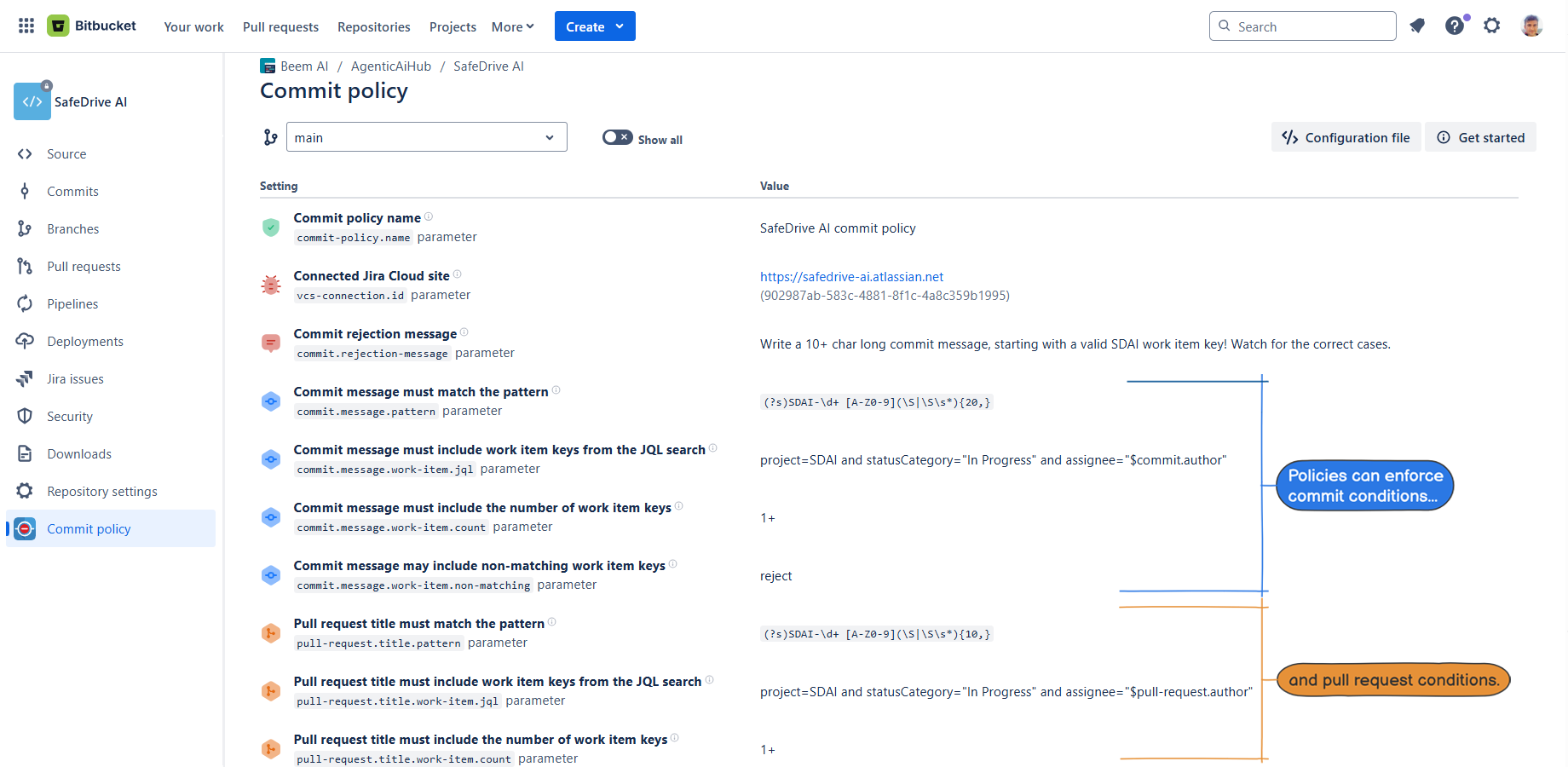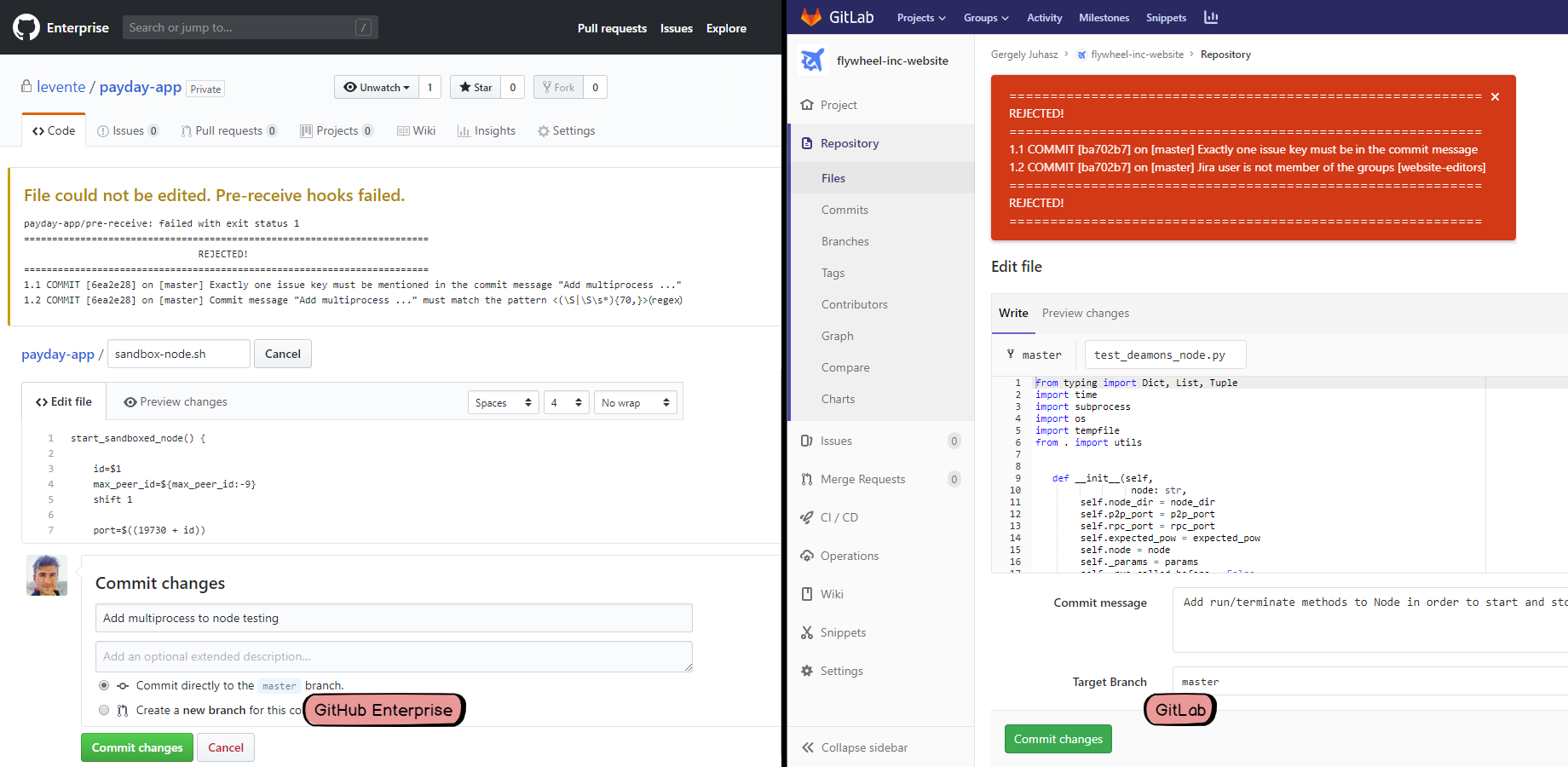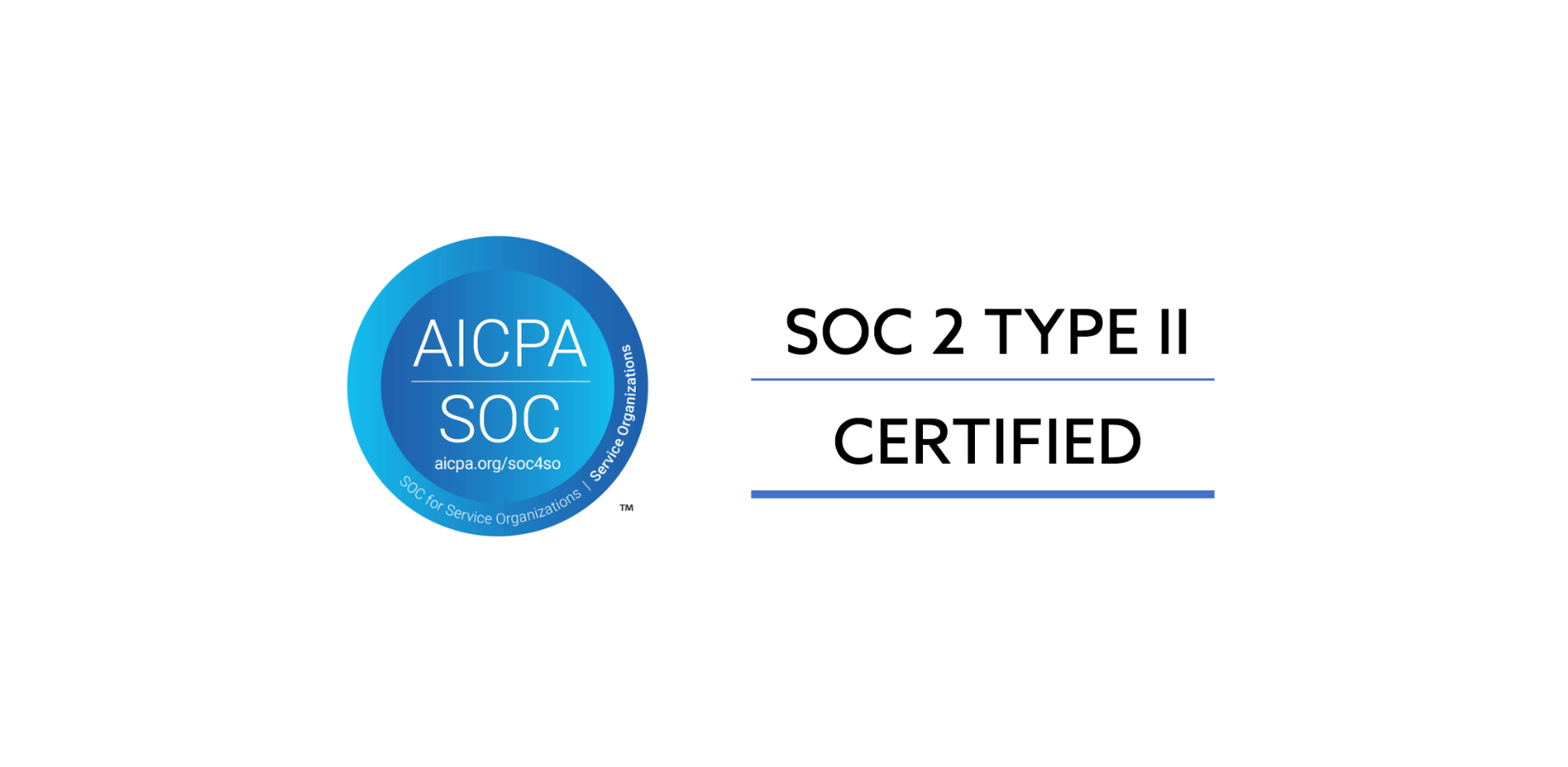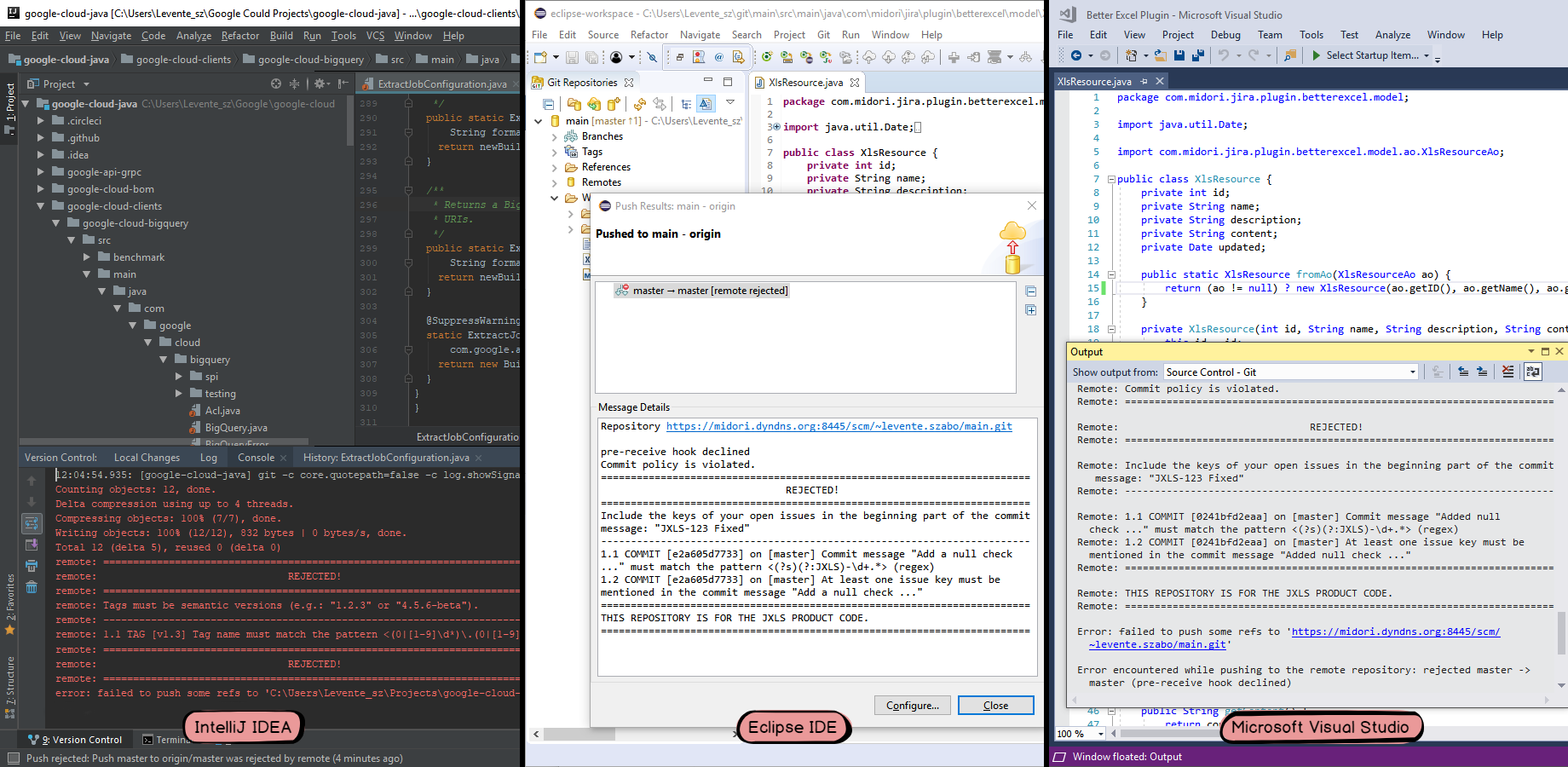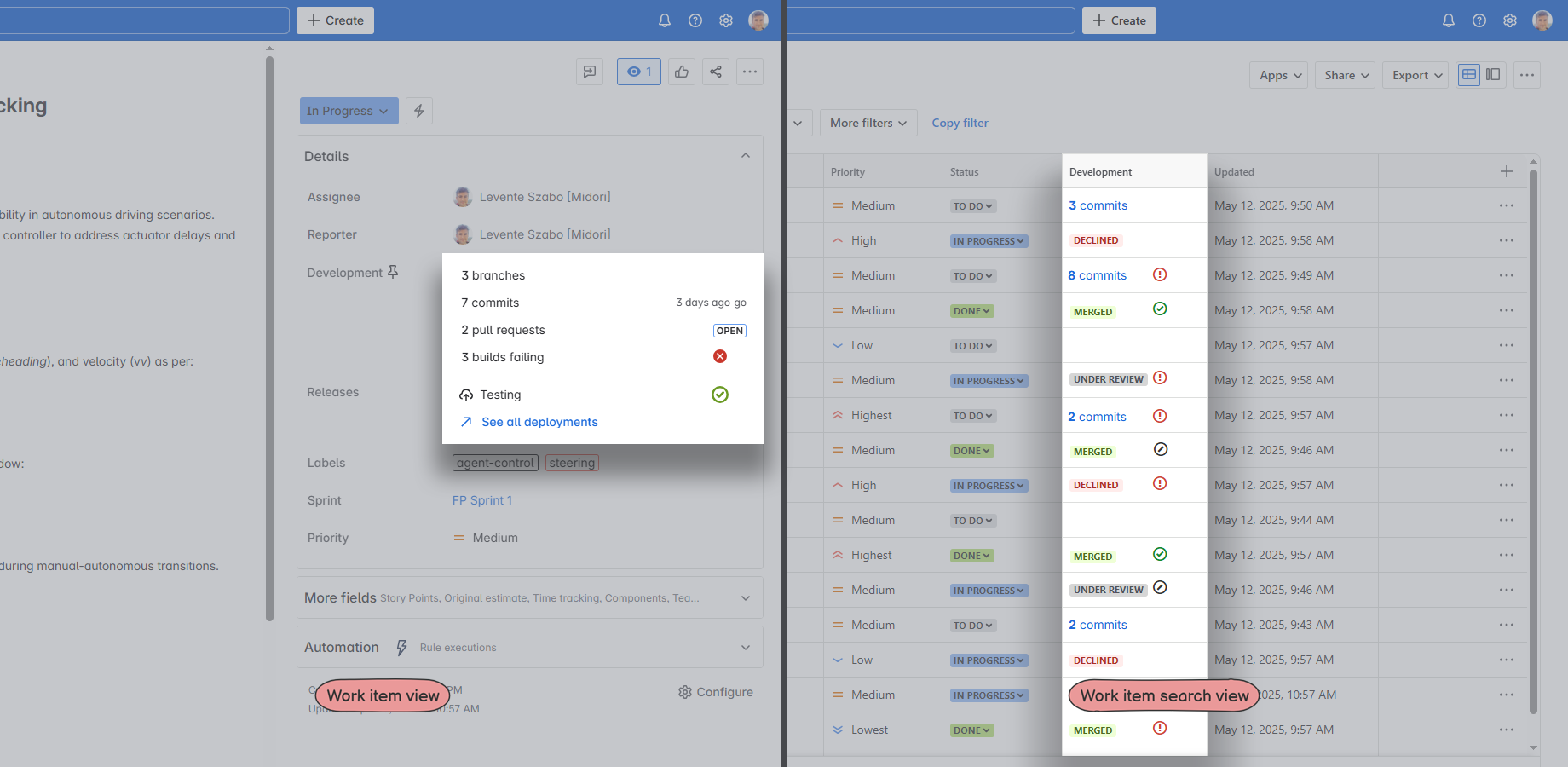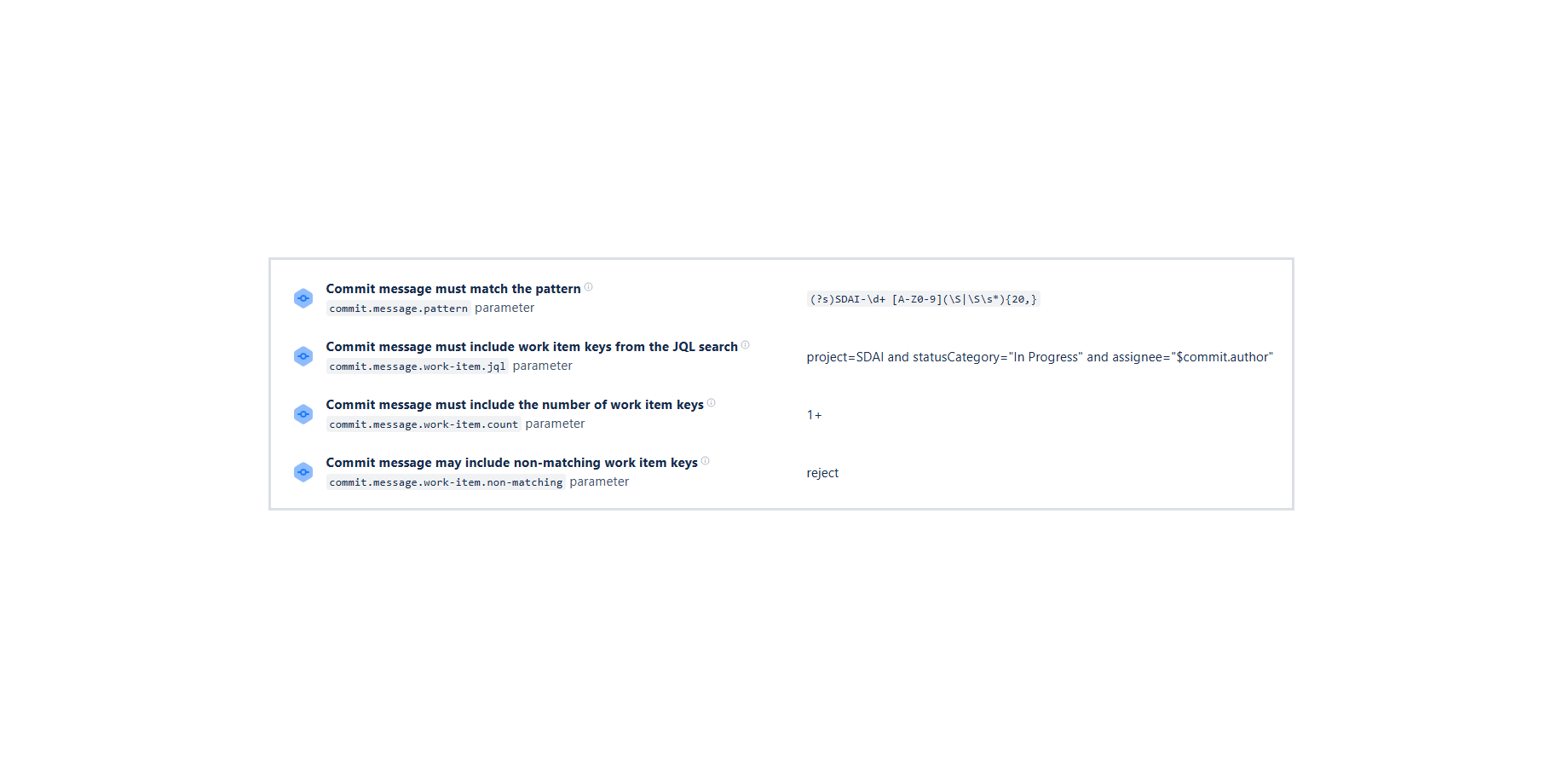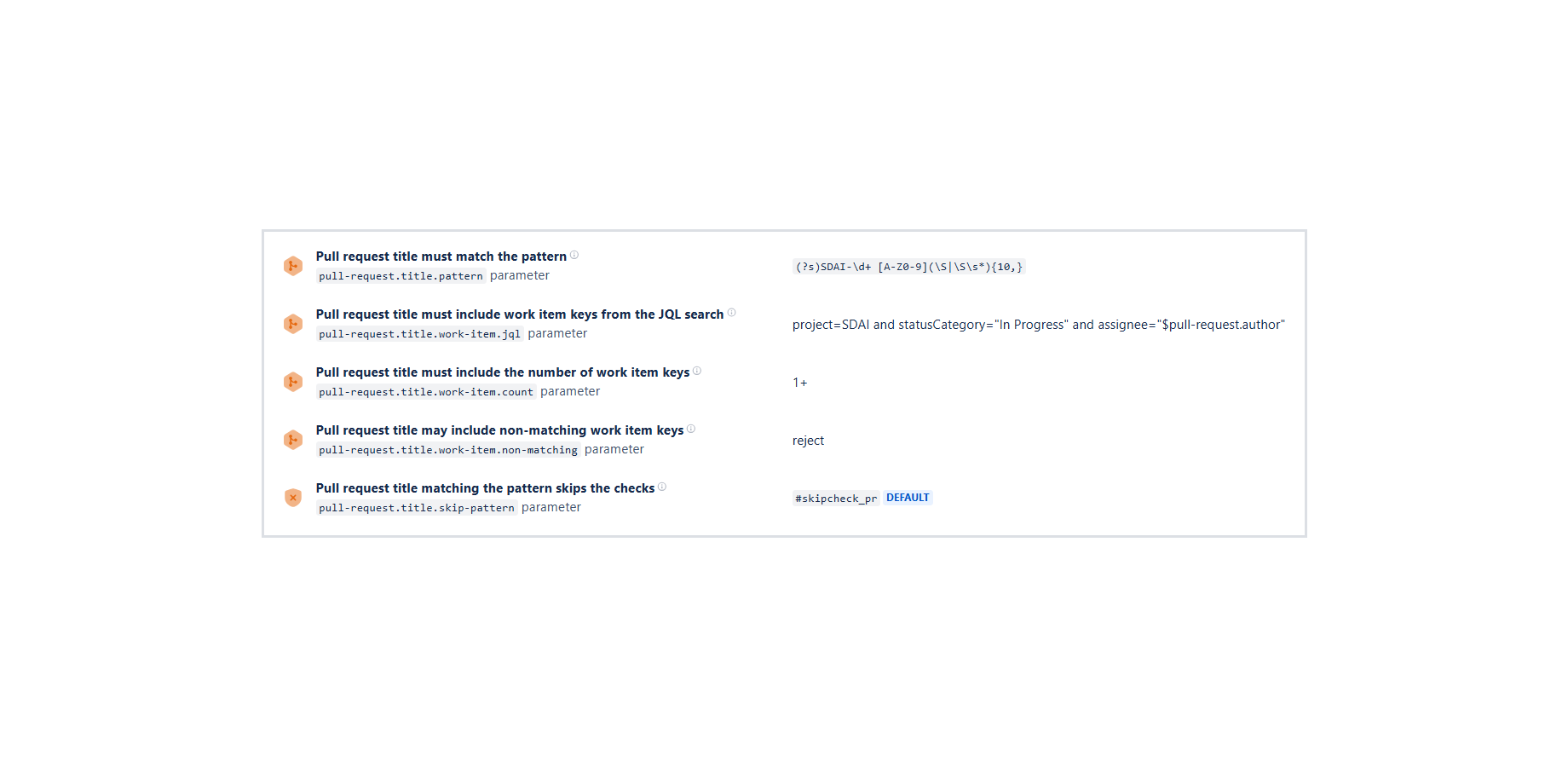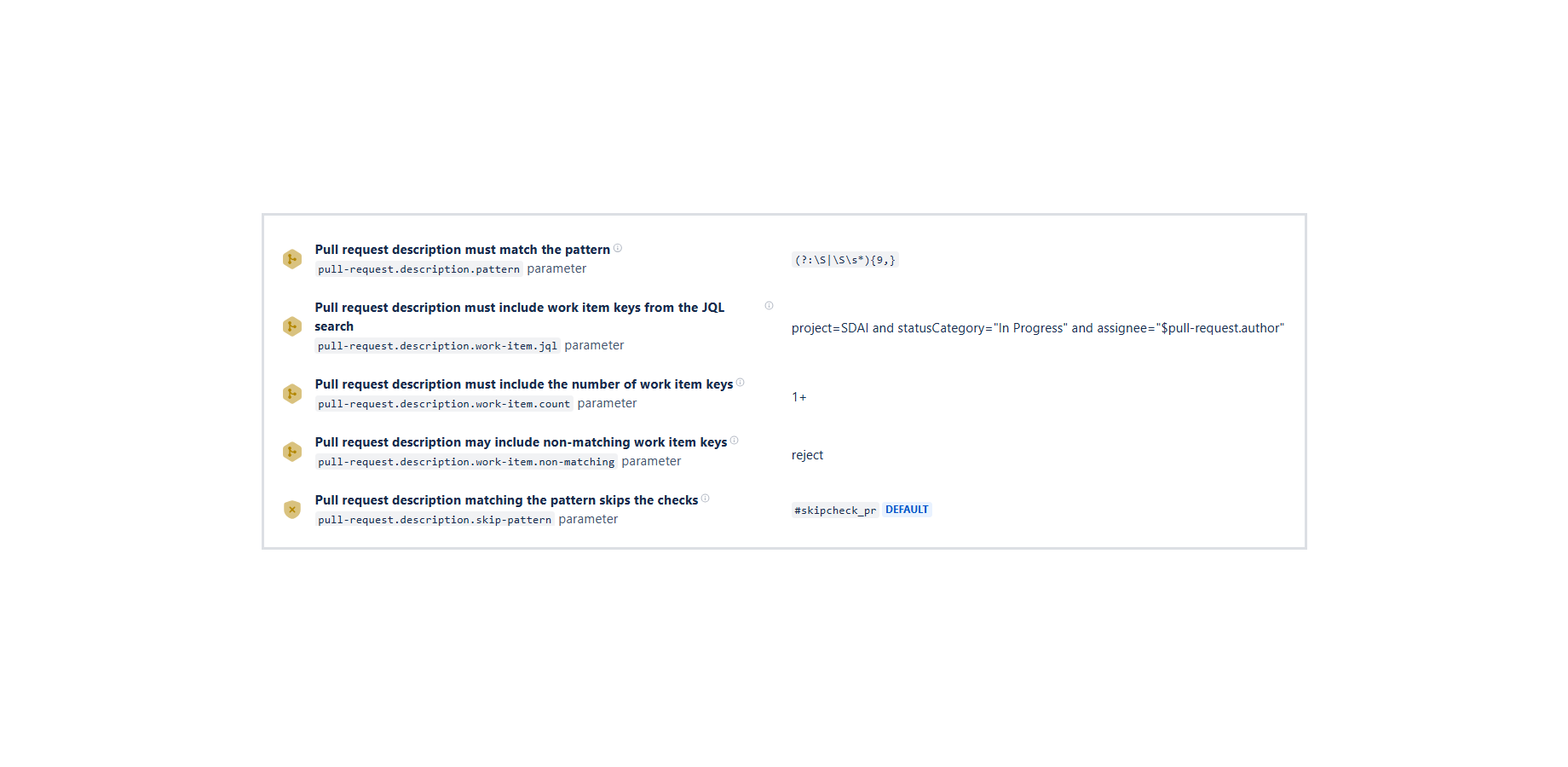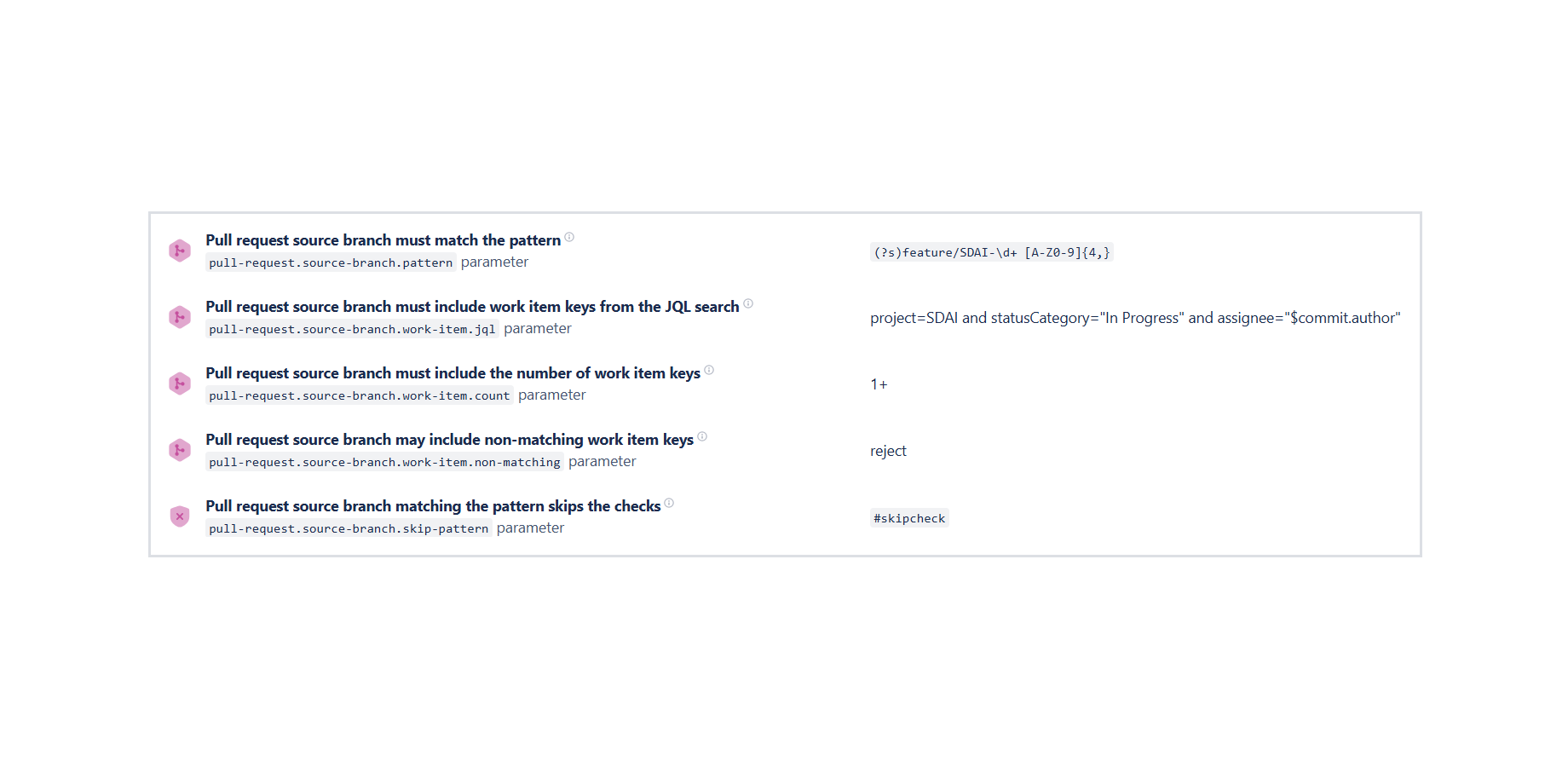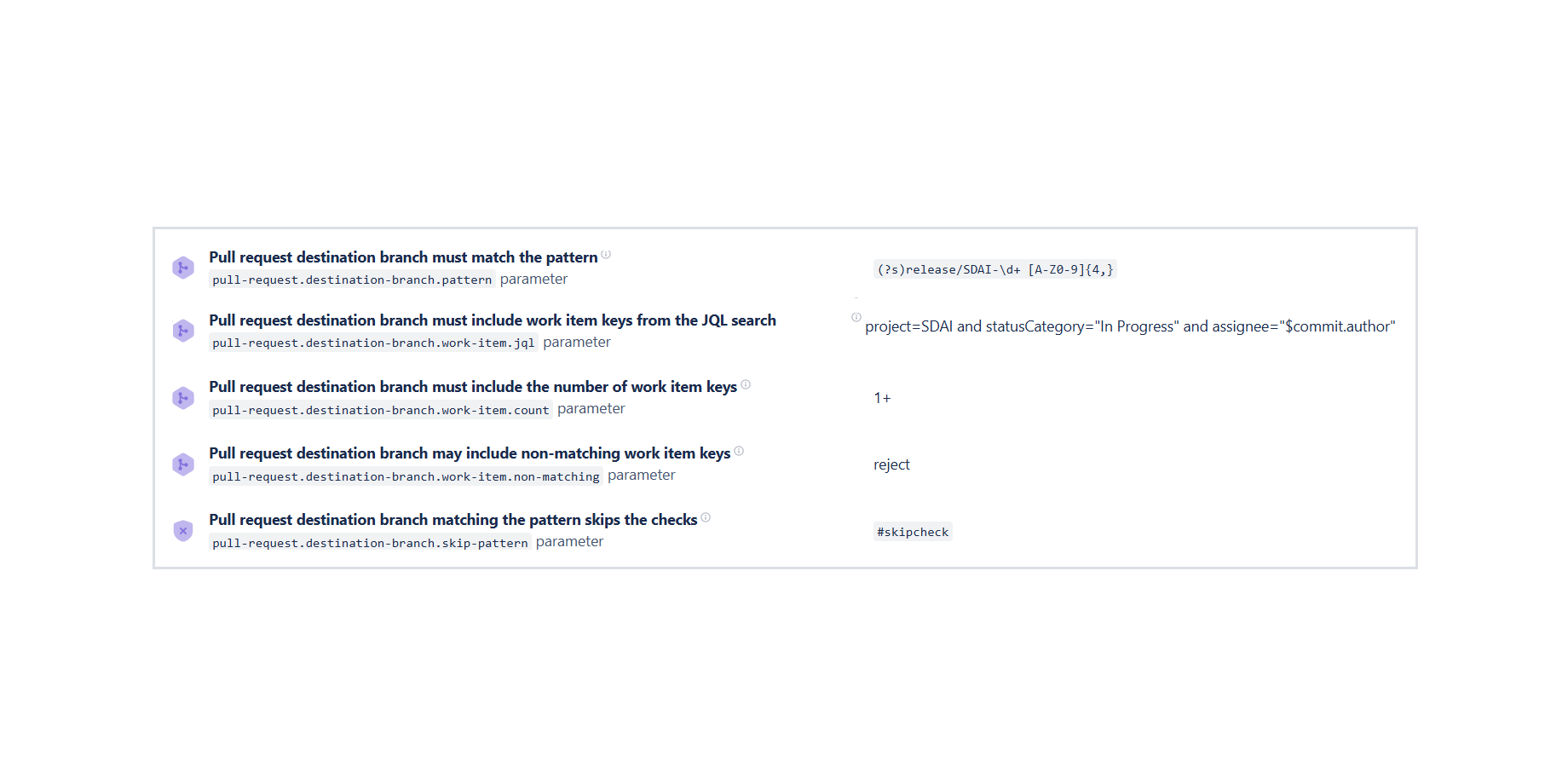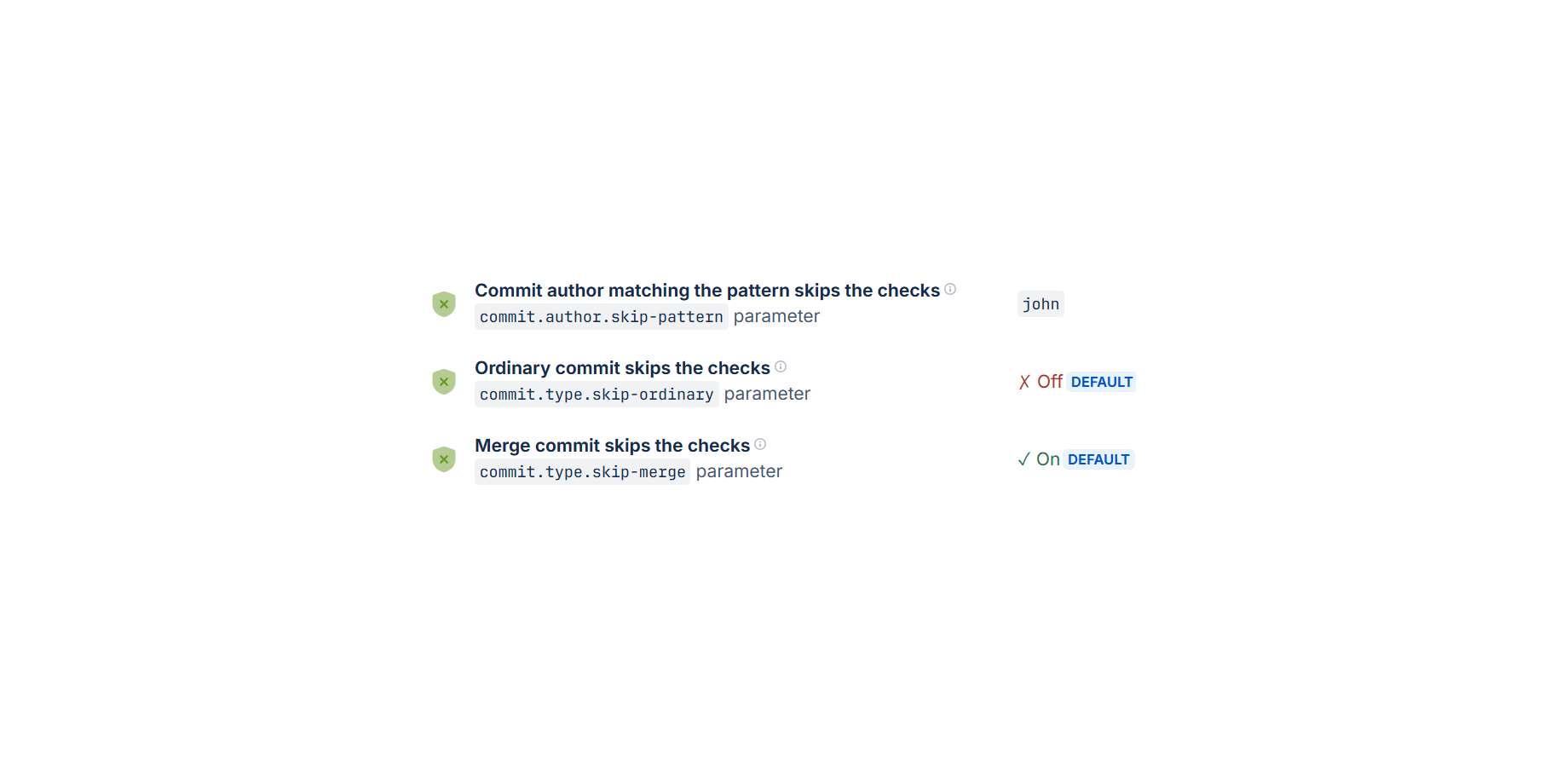
Better Commit Policy for Jira Cloud
Automatically check Git, Bitbucket, GitHub & GitLab commits and pull requests against configurable rulesHow does it work?
Better Commit Policy checks your commits and pull requests against configurable rules. Commits and pull requests that break the rules are blocked until fixed.
Enforce development standards
- validate links between commits, pull requests and Jira work items 🔗
- maintain a well-structured commit history
- ensure traceable changes
- speed up code reviews ⚡
- stay audit-ready
- promote standards-based development
← Learn more by watching the intro video in the left.
Stay in control of every code change
Checks can be limited to:
- specific workspaces
- specific projects 📦
- specific repositories 📁
Checks can validate every commit detail:
- commit message
- commit author (soon!)
- changed files (soon!)
- affected branches
- affected tags (soon!)
- pull request
Supports the developer platform you already use
Built for all major cloud-based Developer, DevOps and DevSecOps platforms.
- Bitbucket
- GitHub (soon!)
- GitLab (soon!)
- Azure DevOps (soon!)
- AWS CodeCommit (soon!)
Ready for the Enterprise
Unlike free or home-grown solutions, Better Commit Policy is:
- Commercially supported
- Scalable (for enterprise-scale teams using Jira and Bitbucket)
- Secure (SOC 2 Type II, vulnerability scanner, bug bounty program)
- Supports complex infrastructures (N-to-M Jira-VCS connections)
- Maintained for new Jira releases (both Cloud and Data Center)
- Well-documented
Catch bad commits before they happen
Fixing bad commits later? Total pain.
Better Commit Policy checks your commits before they're created. ⚡Other commit checker apps for Jira wait until you push. Too slow. Too late.
Works with your current tools
Your team can keep using any standard-compliant VCS client (command-line, GUI tools, IDE integrations) on any OS.
Zero learning curve
After a couple of rejections, clean commits become second nature. ✨
Keep Jira work items and development in sync
Ensure a reliable view of development activity in Jira by enforcing work item references in Bitbucket commits, pull requests, and branch names.
Benefits:
- Reliable Development panel in the Work Item View
- Reliable "Development" column in the Issue Navigator
- Reliable development information on work item cards in Jira boards
- Reliable development information on the Releases page
- Jira automation rules triggered with the correct work item
Enforce well-formatted and traceable commit messages
Ensure every commit is traceable, properly formatted, and linked to the right Jira issue.
-
Commit message must match a pattern
- commit messages must start with a Jira work item key
- commit messages must be 10+ characters long
-
Commit message must contain work item keys from a JQL query
- commits must be linked to one or more valid Jira work items
- commits must be associated with exactly one story in the current sprint
Enforce consistent pull request titles
Accelerate code reviews and reduce your cycle time by ensuring pull requests are well-titled and linked to Jira work items.
-
PR title must match a pattern
- pull request title must start with a Jira work item key
- pull request title must be 10+ characters long
-
PR title must contain work item keys from a JQL query
- pull requests must be associated with a work item assigned to the author
- pull requests must reference bugs scheduled for the next release
Enforce informative pull request descriptions
Maintain PR description standards with custom checks for content, structure, and work item links.
-
PR description must match a pattern
- pull request description must not be left blank
- pull request description must include "Impact" and "How to test" sections
-
PR description must contain work item keys from a JQL query
- pull request description must not contain unresolved work items
- pull requests must be linked to at least one "Test" type work item
Enforce rules for source branches in pull requests
Streamline development with work item linked, well-formatted branch names.
-
PR source branch name must match a pattern
- source branch names must follow naming conventions (example: must start with feature/, bugfix/ or hotfix/)
- bugfix branch names must contain a work item from a specific project immediately after the slash (example: "bugfix/CAL-123-memory-leak")
-
PR source branch name must contain work item keys from a JQL query
- feature branch names must include a "Story" type work item from the current sprint (example: "feature/CAL-456-shared-calendars")
- bugfix type branch names must include a resolved "Bug" type work item assigned to the commit author (example: "bugfix/CAL-789-form-validation-crash")
Enforce rules for destination branches in pull requests
Standardize branch names with validated work item links for critical branches.
-
PR destination branch name must match a pattern
- deploy branch names must include the environment name (example: deploy/staging, deploy/production, deploy/qa and nothing else)
- release branch names must include a semantic version number (SemVer) (example: "release/7.1.0-beta")
-
PR destination branch name must contain work item keys from a JQL query
- deploy branches must be linked to a closed work item (example: deploy/CAL-123)
- hotfix branches must be linked to a high priority work item (example: hotfix/CAL-456-json-vulnerability)
Refine commit policy behavior with custom exceptions
Customize your commit policy to exclude certain users, ordinary commits, or merge commits for greater flexibility.
-
Ignore certain users
- allow selected users to be exempt from the commit policy (example: engineering leads can make changes that regular developers can't)
- skip commits created by your CI/CD system, dependency update bot, automations and such (example: GitHub Actions, Dependabot, Terraform)
-
Ignore ordinary commits
- skip ordinary commits if you only need to check merge commits
-
Ignore merge commits
- skip merge commits if you only need to check ordinary commits
Rigorous change control
Establish processes for compliance with ISO standards, IEC standards and industry regulations in:
- defence
- financial
- avionics (success story)
- automotive
- medical
- pharmaceutical
- other safety-critical systems
Or, just make sure that every change to your code is introduced in a controlled and documented way!
End-to-end traceability
Accelerate requirements validation, compliance verification, impact analysis, coverage analysis and source code audits by bi-directionally linking Jira issues and source code changes:
- requirements ⇔ code changes
- epics ⇔ user stories ⇔ code changes
- tasks / bugfixes ⇔ code changes
- tests ⇔ code changes
- change requests ⇔ sub-tasks ⇔ code changes
- releases ⇔ issues ⇔ code changes
Faster code reviews & audits
Maintain development workflows for consistent repository, code & history.
By making small improvements (useful tips) in the way your team works, common questions like these will be automatically answered:
- "Why was this changed?"
- "Was it tested? In what environments?"
- "Is this within the scope of the current release?"
- "Who approved this merge?"
- "Is there a programmatic test for this story?"
Why should I care about change control?
- Computer system failure cost British Airways $100 million
- Gartner estimates network downtime may cost $300K per hour (average)
- Software failures cause 24% percent of all the medical device recalls according to FDA
- Forrester estimates that Amazon Web Services (AWS) outage affected 100,000 sites
- Software bug would allow hackers to take control over Sydney nuclear plant
- Unauthorized changes disable $2.7 billion US Navy submarine
Integrated with the VCS tools you already use
How does it help me work better?

Helping the developer team comply with regulations and software requirements
"In the aviation industry, we need to be able to prove to authorities how exactly each aerospace system requirement is fulfilled and by what part of the source code.
Better Commit Policy makes it easy to manage our Jira work items towards those requirements, proactively control what is committed to our source code repositories, and ultimately, to comply with regulations."
– Kalen Brown, Associate Electrical and Computer Engineer
Read the story →
How developers of safety-critical systems at Philips manage source code changes
"Before using commit policies, our developers’ behavior was like in the wild west.
We couldn’t match source code changes with Jira issues, it was almost impossible to understand what work has really been done, we wasted time.
The Better Commit Policy app helps us maintain a manageable development process by enforcing some configurable rules in a friendly, but strict way."
– Yakov Yukhnovetsky, DevOps Engineer
Read the story →Who's using it?














I really believe, every software company must incorporate it into its developing process.
This is a must have to have a clean repository. The ability to check the rules also locally is just great.
What I liked here, the plugin didn't force me to change how my developers want to interact with the repositories: in command line, in Bitbucket, in Jira, in any type of git clients.
Not only does this plugin provide exactly the features we were looking for, it was easy to setup with clear instructions. Support was great - extremely helpful, responsive and polite.
more reviews →While the plugin is great, the support is even greater (shout out to Gabor)! The initial environment setup was fairly easy. Just set it and forget it.
Evaluation: try before you buy
- Install the app. (how to install?)
- Get your free trial license that allows using the app without limitations for 30 days. (how to try?)
- When the trial is over, continue using the app by purchasing a commercially supported license. (how to buy?)
- Ask questions or report problems any time by clicking the "Help" tab in the right bottom. (how to get support?)
- Get the latest Better Commit Policy for Jira release announcements, best practices, tips from power users. (how to subscribe?)



